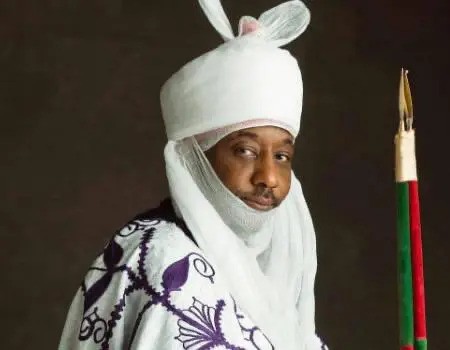Why my government suspended Sanusi – Jonathan
Goodluck Jonathan, the former president, denied on Thursday that he had suspended Muhammad Sanusi II, the current Emir of Kano, and Dr. Sanusi Lamido Sanusi, the former governor of the Central Bank, over allegations that $49.8 billion had disappeared from public funds.
The CBN leadership under Sanusi concocted the accusation, according to Jonathan, who maintained that no such funds disappeared.
Dr. Shamsudeen Usman, a former Minister of Planning in the administration of the former president, and the former president himself co-authored the book “Public Policy and Agents Interests: Perspectives from the Emerging World,” which was launched in Abuja on Thursday during the event.
In the book, he discusses the former CBN governor’s role, claiming that he was fired for disclosing the missing funds while Jonathan was in office.
Sanusi had brought up the episode that, in his view, resulted in his removal as governor of the CBN.
In 2013, Sanusi initially voiced concern over inconsistencies in the transfer of oil revenue, which resulted in the disappearance of $49 billion.
But after consulting with the ministry of finance, he changed his original estimate to $20 billion.
The charges were swiftly refuted by the Jonathan administration, which had accused Sanusi of seeking to destabilise the regime.
President Jonathan removed Sanusi for “financial recklessness and misconduct” as CBN Governor in February 2014, only months after the allegations were made. Nevertheless, a large portion of Nigerians hold the belief that his decision to blow the whistle on the missing monies was politically driven and connected to his suspension.
In 2020, Sanusi was overthrown from his position as Kano’s 16th Emir, but he was restored to his position in 2024.
Although Jonathan, who presided over the book launch, agreed with the book’s concept and suggested it for research, he disagreed with Sanusi’s assertion regarding the lost funds, according to his opening remarks.
Jonathan clarified that Sanusi was not fired but suspended and that the loss of $32 billion from Nigeria’s budget at the time would have had an immediate effect.
The former chancellor of Germany, Angela Merkel, challenged him about it, and he recounted how she explained that such a large sum of money could not have been taken from a country that was already struggling since no one would have known.
I feel compelled to say that I disagreed with one of the contributors on a few points. But being our royal father, I will not take a side. Also present is him.
His assertion that the government’s $49.8bn loss was the reason for his departure is not totally true. He remained on the job. He was suspended when the CBN’s spending was questioned by the Financial Reporting Council. Examination was necessary for serious violations. Why? Because of that.
Time was of the essence, though. His term ended before we were through. He elaborated by saying that he probably would have gotten a callback.
There was no disappearance of such funds, the former president maintained. When the estimates were revised from $49 billion to $20 billion and then $12 billion, Sanusi’s statements started to falter, he added.
“To this day, I remain unconvinced that the Federal Government suffered a loss of $49.8 billion.” Our budget for that year was $31.6 billion. Payrolls continued unabated as a nation with a budget of $31.6 billion lost about $50 billion, yet nobody took note. The writers of this book ought to dig a little further.
“And more so, when our revered royal father came up with the figures, first $49.8 billion, then $20 billion, and finally $12 billion, I don’t even know the correct one,” he stated.
Although the investigators, Price Water Coopers, did not find any signs of theft, Jonathan explained that the NNPC still couldn’t explain the whereabouts of $1.48 billion.
He went on to say that the allegations were baseless, as determined by the investigation of the then-Senate Committee on Finance, which was headed by Senator Ahmed Makarfi.
Later on, though, royal father Sanusi denied Jonathan’s accusation and maintained that he had been “constructively dismissed” from the ceremony.
“I was fired by my boss. My dismissal was productive. Even though he presided over the occasion as Royal Father of the Day, Sanusi made it clear that he does not hold any ill will against anyone and that he continues to appreciate Jonathan.
What the king deemed as efforts to thwart the Dangote Refinery were also something he regretted.
He stated that instead of caving in to special interests, Nigeria should be making the most of its decision to build the refinery and stop importing fuel.
Rather than embracing this chance, we are obstructing it. A result of special interests is this. According to him, when individuals take power, the first thing on their minds is how much money they can get from the government.
In addition, the Emir revealed that the book’s principal author, Usman, had lectured at his university, where he had lauded him for being one of the longest-serving public officials who had never been invited by the Economic and Financial Crimes Commission.
At Thursday’s ceremony, his children formally unveiled the Shamsuddeen Usman Foundation, which they had established in his honour. Education and AI are two causes close to the hearts of the SUF’s members.




